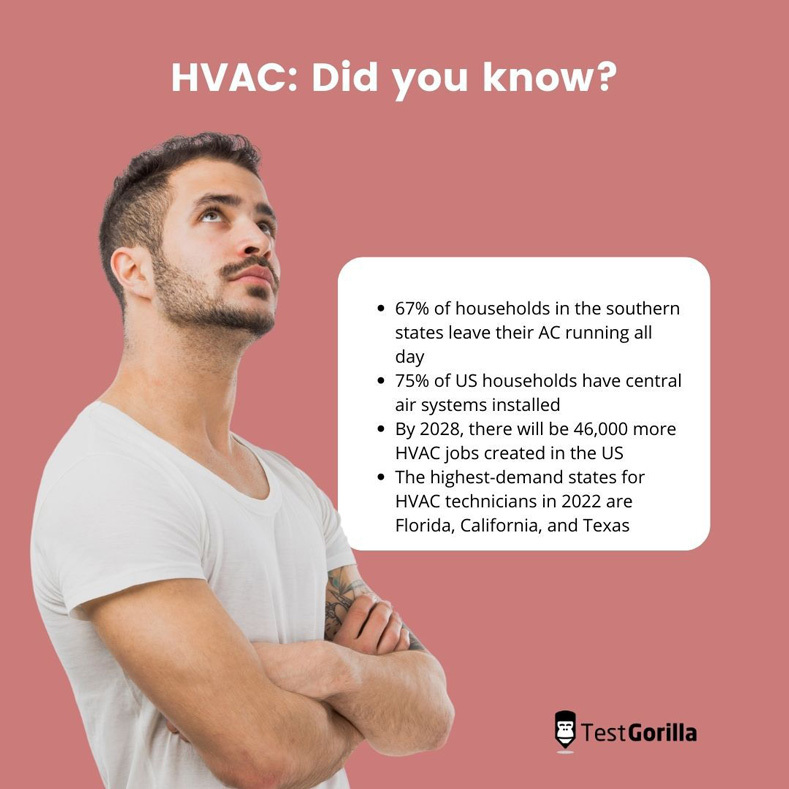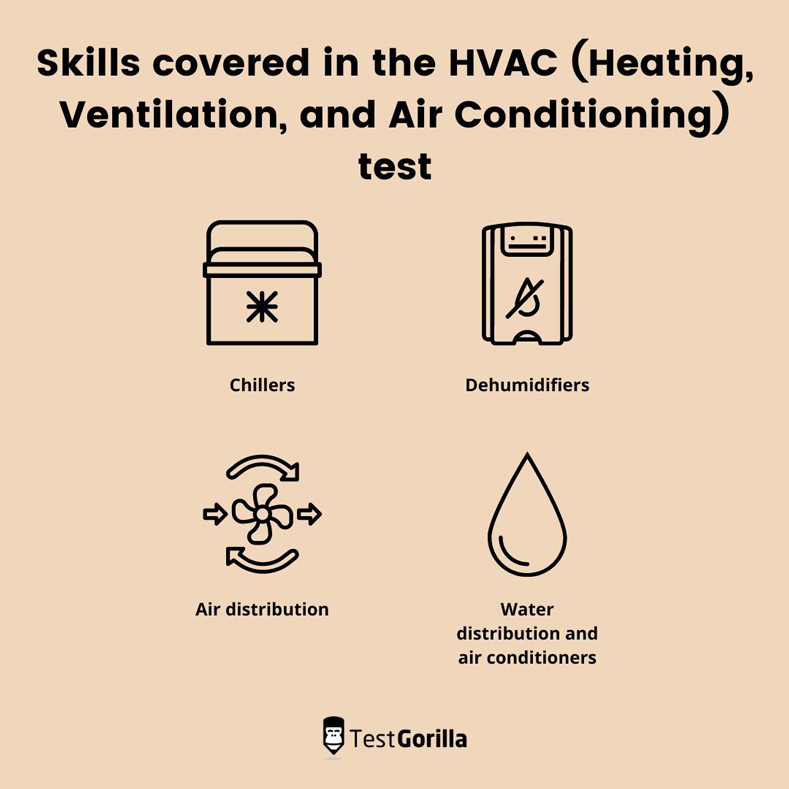Heating, ventilation, and air conditioning (HVAC) seem to fall into that category of things we tend not to notice we need – until they malfunction or break down altogether. That’s when we call for someone with HVAC technician skills.
If you are recruiting HVAC technicians, they need to have the ability to conduct the work safely and efficiently. The best way to do this is to use an HVAC (Heating, Ventilation, and Air Conditioning) test as part of a thorough pre-employment skills assessment, along with interviews for the top candidates.
We’ll take a closer look at how our HVAC technician test is a great tool for screening candidates later on, but first let’s take a look at HVAC technician duties and responsibilities, as well as the skillset they will need to succeed at the job.
Table of contents
- What does an HVAC technician do?
- HVAC technician duties and responsibilities
- Qualifications and professional certifications for HVAC technicians
- HVAC technician skills
- HVAC technician skills testing
- Why not use our HVAC technician skills test in an assessment?
- Let us help you hire your next HVAC professional
What does an HVAC technician do?
HVAC technicians install, maintain, and repair refrigeration, cooling, heating, and ventilation systems in homes and businesses. Within these categories, some technicians have a specialty, such as air quality or solar energy, while others choose to specialize in installation or repair.
Working conditions can be tough for HVAC technicians at times because the equipment is often located in cramped spaces such as crawl spaces or other small areas, or outside where technicians are exposed to the weather.
HVAC technicians have one of the highest rates of injuries and illnesses of all occupations. They face many hazards in their work, including electric shocks, burns, and injuries from handling heavy equipment.
They may also have to work varied schedules and unconventional hours if their employer offers after-hours emergency services. This can be a matter of life and death, as technicians may need to fix a furnace in the early hours during a winter storm for an elderly or vulnerable person.
If you are recruiting HVAC technicians and they will need to be on call for emergencies like these, it’s important that you are clear and honest about it when you create the job description.
HVAC technicians may also need further training as the HVAC installation process is becoming ever more complex, and it’s possible that HVAC licenses will become mandatory in all states in the future.
HVAC technician duties and responsibilities
HVAC technicians have several responsibilities, but it will depend on the employer and those who specialize in specific areas may also have other duties. Typical responsibilities for HVAC technicians include:
Removing old systems
Installing systems
Performing routine maintenance
Training junior team members
Communicating with clients and customers
Ordering and maintaining equipment
Meeting local HVAC codes
Other HVAC technician skills include the knowledge of
Standard practices of the HVAC trade
Theory of HVAC systems
Materials, methods and tools used in the operation and repair of HVAC systems.
Applicable building codes, ordinances and regulations of State and local
authorities pertaining to HVAC
Air compressors and pneumatic controls
Cooling tower and boiler water treatment
Manual and electrical tools and equipment applicable to HVAC
Welding and soldering techniques
Health and safety regulations
Basic record-keeping techniques
Proper methods of storing equipment, materials and supplies
The best insights on HR and recruitment, delivered to your inbox.
Biweekly updates. No spam. Unsubscribe any time.
Qualifications and professional certifications for HVAC technicians
When it comes to essential HVAC technician skills, often a relevant degree, certification, or license is required for someone to work as an HVAC technician. This does differ from state to state, so it’s wise to check requirements where you are.
HVAC technicians generally have some form of college education or apprenticeship training. In many cases, HVAC technicians obtain a full four-year degree within their specialty before obtaining licensure and certification.
Common HVAC professional certifications include those from North American Technician Excellence (NATE). They have a range of exams from entry-level to advanced:
The Ready-to-Work and HVAC Support Technician certificates are geared toward early-career technicians with under one year of experience in the field.
The NATE certification exams and Senior Level Efficiency Analyst exam are designed for professional technicians with at least two years of practical experience.
NATE also offers professional certification exams for experienced technicians to demonstrate their specialized knowledge
The Refrigerating Engineers & Technicians Association (RETA) also has a range of certifications from beginner (Certified Assistant Refrigeration Operator) to advanced level (Certified Refrigeration Service Technician).
In general, though, you can expect candidates to have state licensure and relevant certificates, which can help in evaluating what kind of HVAC technician skills they possess.
HVAC technician skills
The range of HVAC technician skills required depends on the job role, but they need many technical and soft skills to do their work safely and efficiently. We have tests for many of these skills in our test library, and we’ll look at how to combine them with the HVAC technician skills test in a full assessment later. HVAC professionals should be skilled at the following:
Problem-solving and troubleshooting skills
HVAC technicians must be able to identify and fix problems in various systems. They need to respond to customer issues and complaints, and often need to think creatively and know the right questions to ask to get to the bottom of a problem. Our Problem Solving test helps you identify candidates who use analytical skills to evaluate and respond to complex situations.
Critical thinking is also a useful skill that helps HVAC professionals react to changing situations and think on their feet when an original solution doesn’t work as planned. Our Critical Thinking test is useful for identifying candidates who can evaluate information and make sound judgments using analytical skills.
Understanding blueprints
One of the important HVAC technician skills is the ability to read and understand blueprints. HVAC professionals who understand the formatting associated with blueprints will be able to place components in the right locations, which reduces the need for repair or fixing mistakes after installation.
Communication and customer service skills
Because HVAC professionals work directly with customers, these skills are essential. Technicians must be able to explain clearly what needs doing and why, and may need to answer customer questions in a way that is understandable to a layperson.
Customers can sometimes be unreasonable or have poor communication skills themselves, but an HVAC professional needs the ability to stay calm and courteous under pressure.
Time Management Skills
Another one of the crucial HVAC technician skill is time management. It helps technicians organize their schedules, as well as prioritize and manage their tasks. Technicians often have multiple appointments in a day and need to manage their time well in order to do each job in a timely manner.
Our Time Management test helps to identify candidates who can separate urgent from important tasks and know how each one impacts their goals in order to prioritize work for the greatest results. They can plan their own work accurately and coordinate with others, as well as manage distractions to stay focused on their work.
Candidates who do well on this test are capable of reviewing their own work as well as the work of their peers and making any adjustment necessary to their workflow
Hand and power tool experience
Technicians should be able to use a variety of hand and power tools effectively and safely on a job site. Most of this knowledge is gained through training and on-the-job experience. HVAC professionals may also need to know how to use more specialized or industry-specific tools, such as acetylene torches or carbon monoxide detectors.
Mechanical skills
HVAC technicians must have the ability to work with mechanical systems. Knowing how various machines and equipment function can help them decide which components need repairing or replacing. Mechanical skills are also needed to take apart and reassemble machinery efficiently and safely.
Job safety procedures
HVAC work involves some serious safety concerns, so they must know and follow safety procedures.
HVAC workers must wear proper personal protective equipment. Technicians should also be trained in fall protection and fall-arrest equipment confined spaces and lockout/tagout (LOTO) procedures.
The top five HVAC contractor injuries in 2020 were:
Sprains, strains, tears – 2,420
Cuts and lacerations – 890
Fractures – 870
Bruises and contusions – 520
Heat/chemical burns and corrosions – 180
Computer skills
HVAC professionals often use software programs to control and maintain systems, so it’s important for technicians to understand how to effectively use computer programs. HVAC technicians generally remain updated and proficient in the latest technologies used in their industry.
Physical ability
An important but sometimes overlooked item on the list of HVAC technician skills is their physical fitness and ability. HVAC work is often physically demanding, requiring long periods spent working in cramped spaces or uncomfortable positions, and technicians often have to carry heavy equipment up flights of stairs to reach a work site.
HVAC technician skills testing
Our HVAC (Heating, Ventilation, and Air Conditioning) test is an intermediate-level skill test designed by an industry professional with nine years of working experience as a Heating, Ventilation, and Air Conditioning (HVAC) and Utilities engineer.
This HVAC technician skills test evaluates candidates’ abilities to maintain and troubleshoot a range of heating, ventilation, and air conditioning equipment. This includes chillers, dehumidifiers, air, and water distribution equipment, and air conditioners.
The HVAC technician skills test focuses on the practical application of knowledge through on-the-job maintenance and troubleshooting scenarios. This will help you identify HVAC technicians who have hands-on experience in dealing with a range of HVAC systems.
Why not use our HVAC technician skills test in an assessment?
As mentioned earlier, you can combine our HVAC technician skills test with up to five other tests of your choice to create a full skills assessment. For example, you could use the HVAC technician skills test along with our Critical Thinking test, Time Management test, Problem Solving test, and another test of your choice from the test library.
For the best results, we recommend using an assessment at the start of your hiring process. This enables you to screen candidates before the interview rounds, so you save valuable time by only interviewing those who have scored well on the tests. To find out more, you might want to read our post on why skills assessments should come before the resume process.
Our tests are grouped into the following categories:
Role-specific
Cognitive ability
Language
Personality and culture
Programming skills
Situational judgment
Whatever test types you are looking for, you’re sure to find them in our test library (over 200 tests and counting) so you can create a skills assessment that works for you. There’s even the option to create custom questions to give you even more flexibility.
Let us help you hire your next HVAC professional
It can be hard to make the decision to hire HVAC candidates based on resumes and interviews alone.
We want to show you how skills testing gives you the hard data you need to make an informed hiring decision. Our HVAC technician skills test will effectively screen your candidates so only those who really have the skills to succeed will do well on the test.
Sign up for your free plan (it takes less than 30 seconds) to get started on building your first assessment today. There’s no time limit on our free plan, so it’s yours to keep.
If you want more information or to see how our products work first-hand, book a free 30-minute live demo with our sales team, who will be pleased to answer any questions you may have. If you’re ready to dive right in, head to our pricing page and check out our range of plans to suit all businesses.
You've scrolled this far
Why not try TestGorilla for free, and see what happens when you put skills first.
















